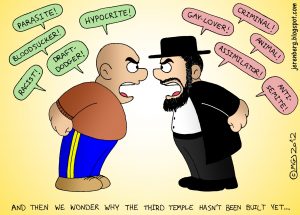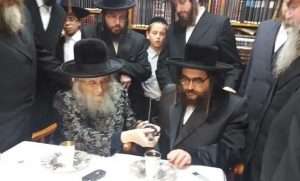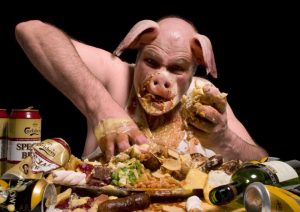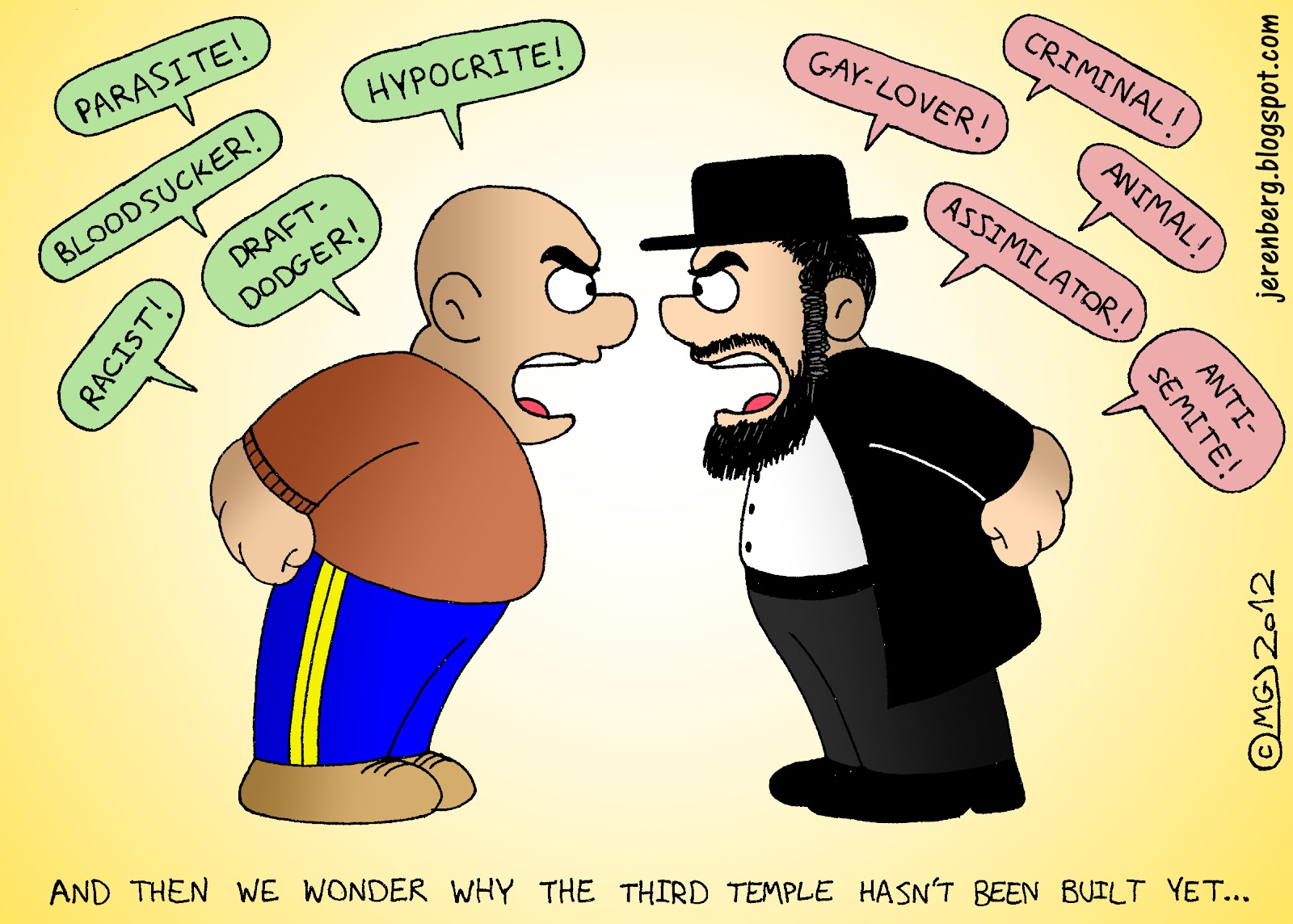 Let’s begin with a big mazel tov shout out to Shayna and Ezzi Ungar -nee Gottesman, to the very excited grandparents, Judith and Shlomo Gottesman -very dedicated friends, to Chaya and Dovi Ungar, to great grandmother, Mrs. Blanche Lerer, to Rabbi and Mrs. Moshe and Sondra Gottesman, and to all siblings, aunts, uncles, cousins and friends, upon the birth of a baby daughter (what else is new in the ever growing -keyn yirbu- extended Gottesman family?) born yesterday. Welcome to the world baby Ungar and may you be a source of nachas to all.
Let’s begin with a big mazel tov shout out to Shayna and Ezzi Ungar -nee Gottesman, to the very excited grandparents, Judith and Shlomo Gottesman -very dedicated friends, to Chaya and Dovi Ungar, to great grandmother, Mrs. Blanche Lerer, to Rabbi and Mrs. Moshe and Sondra Gottesman, and to all siblings, aunts, uncles, cousins and friends, upon the birth of a baby daughter (what else is new in the ever growing -keyn yirbu- extended Gottesman family?) born yesterday. Welcome to the world baby Ungar and may you be a source of nachas to all.
Raboyseyee and Ladies:
The Rebbe’s Premature Three Steps Backward & Why Moshiach (The Messiah) Is Not Here Yet & Likely Not Coming Anytime Soon:
Harking back to around Chanukah time, Jewish weekly papers and magazines in every community, began featuring ads for Pesach programs all over the world: mamish. Kimat all highlighted the entertainment each was offering during Chol Hamoid (intermediary days of Pesach), which this year ran a full four days: gishmak. And while those who decided to observe Pesach and its trimmings away from home, the in-laws, and or, with other family members they can’t stand the sight of -let alone spend a few days with- enjoyed a magic show, a mentalist, comedy night, and or, a concert or two by various well known performers, over where the Oisvorfer spent Pesach, the program, in addition to a concert, also featured a visit by a prominent rebbe. And we begin this week’s review of parshas Shmini with rebbe talk why? What has a rebbe’s visit to do with kosher and non-kosher animals, fowl, birds, fish and insects, all prominently featured in this week’s parsha as the basis for all the kosher laws? And how is the rebbe’s visit connected to Moshiach? Let’s find out.
 On Wednesday the third day of Chol Hamoid, the program featured a visit from the Satmar Rebbe. That’s not entirely emes: though he is a rebbe and though he is of the Satmar sect of Chasidim, and though he was sporting a royal blue bekeche (Chassidic long shiny coat) and a beautiful shtriemel valued at an estimated $7-9 thousand dollars, he is in fact not the grand rebbe of Satmar. As it turns out, there are two grand rebbes, each of whom, after spending millions of dollars in complicated and ugly court proceedings, find themselves co-existing in a cold war (they do not speak) with each laying claim to approximately half of the Satmar fortune estimated to be in the tens of millions. Many. He is the son of one of them, leads a congregation of his own in Williamsburg. His two brothers, both younger, also lead their own congregations.
On Wednesday the third day of Chol Hamoid, the program featured a visit from the Satmar Rebbe. That’s not entirely emes: though he is a rebbe and though he is of the Satmar sect of Chasidim, and though he was sporting a royal blue bekeche (Chassidic long shiny coat) and a beautiful shtriemel valued at an estimated $7-9 thousand dollars, he is in fact not the grand rebbe of Satmar. As it turns out, there are two grand rebbes, each of whom, after spending millions of dollars in complicated and ugly court proceedings, find themselves co-existing in a cold war (they do not speak) with each laying claim to approximately half of the Satmar fortune estimated to be in the tens of millions. Many. He is the son of one of them, leads a congregation of his own in Williamsburg. His two brothers, both younger, also lead their own congregations.
The rebbe spent some time discussing current events. More specifically, he enlightened and updated those in attendance regarding proceedings which had unfolded in Albany just a few days prior and where, -as reported in the NY Times and other on-line forums- one frum State Senator (Simcha Felder) held up the entire New York State budget -on a Friday night no less- under orders from the (grand) Satmar Rebbe until the Governor agreed to modify language calling on yeshivas to offer a broader range of secular subjects to their Chasidic students, an anathema mamish to the rebbe and his followers. It was actually informative and entertaining. What happened next? Shoin, when Yiddin get together in the afternoon, you can count on one thing: Mincha broke out.
Those familiar with rebbe protocols avada know that the Shatz (the person leading the service) will typically wait for their own rabbi to complete the Shmoineh Esray (Amida) before beginning chazoras hashatz (the repetition). At this program, there was no resident rabbi. So far so good and veyter. The room was of course quiet as all davened mincha. One by one, people completed their prayers. The Shatz was ready to begin. He looked around, the visiting rebbe too had completed his prayers. He had already taken the customary three steps backwards. Ober the Shatz did not begin the repetition. Why not? Because the gabbi, not a chosid, told the Shatz to wait. Why wait? Because one more Yid was still davening the amida and the gabbi told the Shatz to wait for this gentleman. That gentleman finished approximately 30 seconds after the holy rebbe himself. OMG!
And while few in the room took notice that the rebbe was done and that the Shatz was not yet beginning, a few chasidim in the room -all of the Satmar variety, as well as the Oisvorfer- did. Nothing however was said. Following Mincha, the rebbe said his goodbyes, wished all a happy Pesach and blessed a few individually. It was time to move onto the next activity, a chol hamoid concert. That event went smoothly. The Oisvorfer, who enjoys crooning from time to time, joined and sang along. So far so good.
On Thursday morning, the last day of chol hamoid and also erev Yom tov of the second days, the Oisvorfer found himself at shachris (morning prayers). Following Hallel it was time to read from the heylige Toirah which was removed from the ark and placed on the bima. The first three readers were called, the koihen, the levi, and the yisroel. It was time for the last aliya (four are called during Chol Hamoid). Just then a Bucharian fellow walked in and while in the midst of donning his talis, was suddenly noticed by the gabbi who called him to the Torah. That did not sit well with one of the chasiddim who yelled out to the gabbi questioning and demanding to know why this gentleman who was still in the midst of donning his talis was called to the Torah. The gabbi retained his composure and answered azoy: we can discuss this after davening, outside of the shul, not here and not now. He was correct: yelling out in front of the shul and causing a shtikel scene and some embarrassment to the Bucharian -who was clueless- was not in order. Ober, a second later, another chosid, this one the father of the gentleman who made the remark, also chimed in and supported his son contending that the gabbi should not have given the Bucharian the aliya. Were there not enough other Yiddin in the room to select from? The father’s tone was angry and confrontational. This time the gabbi yellowed right back at him. The yelling got louder and within seconds, the gabbi was nose to nose with the Satmar chosid who by this time had yelled out “you don’t give respect to Chasidim.” The gabbi was infuriated as was the chosid. One more word and punches were going to fly. A few actually left the room fearing a fight. It never happened, but it was damn close. Ober what was driving all this anger? Were they really upset that the hapless Bucharian Jew who popped into shul quite late was being called to the Torah? So what?
 Ober, what the gabbi did not know or did not realize was that their anger had been building since Mincha the day before. They were appalled that the gabbi did not respect their rebbe. Their anger had been festering since Mincha when the gabbi instructed the Shatz to wait for one more Jew to complete his prayers. He did not yield to the rebbe who was already done. How dare the gabbi leave the rebbe standing there for an extra 30 seconds? Where was the gabbi’s derech eretz (respect) for the rebbe and his chasiddim?
Ober, what the gabbi did not know or did not realize was that their anger had been building since Mincha the day before. They were appalled that the gabbi did not respect their rebbe. Their anger had been festering since Mincha when the gabbi instructed the Shatz to wait for one more Jew to complete his prayers. He did not yield to the rebbe who was already done. How dare the gabbi leave the rebbe standing there for an extra 30 seconds? Where was the gabbi’s derech eretz (respect) for the rebbe and his chasiddim?
And this my friends is among the reasons the Oisvorfer has said time and again that the Moshiach -may he come speedily in our time, omen!- is in fact not going to appear one day earlier than ordained by the RBSO. When is that? Ver veyst! Some say he will arrive by the year 6000; FYI, we are in the year 5778. Others say his arrival could be hastened were the Yiddin -all of them- to properly observe one shabbis. Some say two are required. Shoin: whether it’s one or two, it’s unlikely either will be met. Some say that were the Yiddin to suddenly love one another and stop fighting over narishe zachin (bs), he could come sooner. Who was at fault here? Why did two Yiddin nearly come to blows? Why was it necessary to exchange words so publicly and mar the spirit of Yom tov? The bottom line: Conditions which led to the destruction of the second Beis Hamikdash (Second Temple) -namely, baseless hatred- still prevail. Nothing has changed.
The bottom line: fault for this ugly display of emotion may perhaps lie with the rebbe himself and may explain why he is not yet ready for prime time as a grand rebbe. Even a grand rebbe in training should be aware of his surroundings. Perhaps the rebbe should have looked around and realized that one more yid was still davening. Perhaps he concluded his prayers 30 seconds prematurely? A seasoned rebbe knows when to finish davening the amida. Almost with precision, rebbes and rabbis know to finish last. In any event, while this week’s parsha teaches us all about kosher and non-kosher, it is abundantly clear that the behavior on display that day was not kosher. Shoin, with the opening rant out of the system, let’s learn some parsha.
Kosher is big business, it’s mistama the biggest of all the industries the RBSO created for the Yiddin to enjoy and make a living from. And even within kosher, there is regular kosher, glatt kosher, kosher but dairy, kosher and pareve, kosher and also for Pesach and myriad organizations bilking…err, we meant earning millions making sure that all is kosher. Mamish tens of thousands of Yiddin all over the world are involved -directly and not- in the kosher food business. It’s so big that in recent years, even the goyim decided to enter this marketplace and today kosher signs come in so many sizes, shapes, colors and varieties, one mamish needs to make a concerted effort to eat non-kosher. Some taka do just that: yikes!
 Ober, did the RBSO tell us why He wanted us to eat kosher? Did He tell us why certain fish and other insects were not kosher? No! Instead He just barked out the instructions and left it up to the good rabbis, sages and others to put on the spin. And why would the RBSO care what we ate for breakfast, lunch or dinner? Would it be so girferlich if we ate some bacon in the morning, a cheeseburger or non-kosher pizza for lunch? Maybe even a shtikel ham? Ober Raboyseyee, efsher we can kler azoy: The kosher laws were given by the same RBSO who has placed other boundaries around our behavior in every other area of life and esfarshteytzich (stands to reason) that if we accept His authority, although we do act out from time to time, He has also the authority to place boundaries around our diets. Shoinerleydigt (settled)! Moreover, if we acknowledge that He has the authority to regulate our sexual inclinations and appetites, though there too, we avada don’t always follow the rules, if you chap, we must also recognize that He has the authority to regulate our stomachs. Shoin and case closed.
Ober, did the RBSO tell us why He wanted us to eat kosher? Did He tell us why certain fish and other insects were not kosher? No! Instead He just barked out the instructions and left it up to the good rabbis, sages and others to put on the spin. And why would the RBSO care what we ate for breakfast, lunch or dinner? Would it be so girferlich if we ate some bacon in the morning, a cheeseburger or non-kosher pizza for lunch? Maybe even a shtikel ham? Ober Raboyseyee, efsher we can kler azoy: The kosher laws were given by the same RBSO who has placed other boundaries around our behavior in every other area of life and esfarshteytzich (stands to reason) that if we accept His authority, although we do act out from time to time, He has also the authority to place boundaries around our diets. Shoinerleydigt (settled)! Moreover, if we acknowledge that He has the authority to regulate our sexual inclinations and appetites, though there too, we avada don’t always follow the rules, if you chap, we must also recognize that He has the authority to regulate our stomachs. Shoin and case closed.
Though many mitzvois in our special tradition encourage the exercise of human intelligence in the worthy attempt to chap the profundity of the RBSO’s laws, none of them make one’s observance of the laws conditional upon one’s understanding of them. The heylige Toirah lays out the framework for the original “you are what you eat” manifesto, aka: eating and keeping kosher and ad hayoim hazeh (until today), keeping kosher or eating kosher remains a shtikel mysterious. Why? Because these laws are part of the chukim, laws given to us, the RBSO’s chosen people, without any rational reasoning as to why we should follow them. Keeping kosher defies logical reason. In other words: we are to keep kosher! Why, is none of your business! Mistama the RBSO had good reason and one day, hopefully not too soon, you can ask Him directly.
Ober after giving this topic more thought, the Oisvorfer has concluded that the RBSO, as He always does, had a plan. And what was the plan? The plan was that by dictating kosher laws, not just would He create jobs and business opportunities that included manufacturing, distribution, slaughtering, kosher food expos, eateries, mashgichim (supervisors), chasiddishe truck drivers with big key chains, and many more to pick from, but the plan went deeper. The RBSO chapped that His Yiddin need to spend time together and away from the goyim who could possibly influence them towards avoido zoro and other avayrois. He didn’t want us eating out in restaurants where one can be seated near a hot shiksa model. Yiddin needed to meet and see each other regularly. So- for the men, He gave us shul where men are supposed to meet daily, say a few words out of the siddur, schmooz, bad mouth a few people, tell or listen to a few jokes, gossip and on shabbis and other occasions, to also make a le’chaim, plan and plot your own breakaway minyan and more. Shul is fun Ober what about the veyber, the women? Nu, for the women He created the kosher destination. Indeed because we all eat kosher, we tend to shop at the kosher supermarkets and there, while moving the veygila (shopping cart) up and down the aisles, the women, accompanied rarely by their men, get to schmooz with one another, gossip and catch up on all the local loshoin horo, fashion and of course bad mouth a few people. And it’s taka emes: Yiddin meet each other at the local kosher bakery; they shop at the same grocery and patronize kosher butchers and restaurants. Seemingly, these laws are a major force in maintaining Jewish unity and act as a social barrier against assimilation by creating a feeling of community among the Yiddin. Gishmak.
Moreover, one of the effects of the dietary laws, is mamish alluded to in this week’s parsha. Says the heylige Toirah (Vayikra 20:25-26): “You shall distinguish between the clean animal and the unclean and between the clean bird and the unclean… You shall be holy for Me, for I, G-d, am Holy; and I have separated you from the peoples to be Mine”. Says the Ohr Hachaim azoy: These pisukim (verses) suggest that there is a link between observing the laws of kashrus and maintaining our identity as a distinct, unique people among the nations of the world. Gishmak and shabbis tish worthy. And the bottom line: keeping kosher and kosher in general, has contributed very significantly to our survival as a distinct nation. Yiddin all over the world have common dietary patterns. We are what we eat.
 Nu, let’s now go back to the very beginning of Parshas Shimini ( eighth) which begins with these words: Vayihe Byoim Hashmini (and it was on the eighth day). The words are ominous and our rabbis concluded, for reasons we will chap just below, that the word Vayihe, more typically than not, portends danger. Bad things are about to happen. Nu, if you think back to your own eighth day, avada you can relate ober what happened in this week’s parsha that was so giferlich?
Nu, let’s now go back to the very beginning of Parshas Shimini ( eighth) which begins with these words: Vayihe Byoim Hashmini (and it was on the eighth day). The words are ominous and our rabbis concluded, for reasons we will chap just below, that the word Vayihe, more typically than not, portends danger. Bad things are about to happen. Nu, if you think back to your own eighth day, avada you can relate ober what happened in this week’s parsha that was so giferlich?
Seemingly, way back in parshas Shemois, Moishe committed a giferliche sin and this week, the RBSO, will take him to task and punish him by stripping him of the kahuna. Moishe was a koihen? Indeed he was!
Seemingly the eighth day followed the seven days during which Moishe was the acting Koihen, efsher auditioning for the job. He also erected and dismantled the Mishkan daily during that period. Ober on this eight day, he was stripped of his priestly duties and Aharoin his older brother, was appointed as the first ever koihen godol (big Kihuna). Nice reward! Is that logical? Wasn’t Aharoin the fine gentlemen who collected the gold and then threw the gold into the fire from which the Egyel Hazohov (golden calf) emerged? And if Moishe was stripped of his duties for a sin we will hear about in a few sentences mamish, how was it that Aharoin, who was involved in the meyseh that defined the Yiddin for generations – some say until today- have been rewarded by being appointed the big Kihuna? What’s pshat? And taka says Rashi, quoting the heylige medrish azoy: “When Aharoin saw that all the sacrifices were offered and all the rituals were performed, yet the Shechinah ([Divine Presence) did not descend upon the Yiddin, he was distressed. He said, ‘I know that the RBSO is angry with me and because of me, the Shechinah did not descend upon the Yiddin.’” Moshe tried to tell Aharoin this was not the case, but Aharoin remained distressed.
One would think that if Moishe was replaced by his brother who mamish built the Eygel, that he Moishe must have really done a big no-no to be so unceremoniously dumped from his job but after seven days. And efsher you’re taka wondering what terrible crime could Moishe have committed? Doesn’t the only real ugly incident, the one where Moishe used his shtekin (staff) instead of his mouth, the one that cost Moishe his visa into the holy land, come only later in the Mibdar journey? It does, it’s still weeks away. Did Moishe commit a more serious crime? Is it covered in the heylige Toirah? Seemingly, using the shtekin instead of the mouth, has gotten people into much trouble over the years, if you chap. Ober when you hear what he did and how seemingly angry the RBSO was and how the RBSO never forgot that Moishe sinned, it should send shivers down your spine. Because it appears that the RBSO does not forget and that your sins are mamish piling up on your liability ledger. Moreover it appears that the RBSO has a long memory and that is certainly not good news for those that believe He is elsewhere occupied watching the charedim demonstrate against the very land they live in and the government that feeds them. And taka while the RBSO is quite busy, efsher making shiduchim ver veyst, He indeed does have a long and solid memory.
What was Moishe’s grave sin? Did he marry yet another shiksa; two weren’t enough? Nu, it goes all the way back to Parshas Shemois and to the mayseh (incident) where the RBSO asked Moishe to go take the Yiddin out of Mitzrayim. Said Moishe to the RBSO (Shemois 4:13): “No! Send whomever you will send.” Is that the way to talk to the RBSO? Did Moishe think he was talking to his eishes chayil (wife) at the time? Seemingly, the RBSO took note of this shtikel incident and said to Himself that one day…..He’ll remember this. Avada now many can chap why many meforshim state that the RBSO has male and female characteristics: remembering every detail of everyone’s chatoim (sins) is zicher a character trait the RBSO gave to women. In fact, the Oisvorfer’s own eishes chayil can, in any disagreement, instantly recall anything and everything the Ruv did wrong in the past 26 years. Nu, considering how many misdeeds there have been, that’s a pretty remarkable trait and talent. Vey is mir! Ober she is not alone; seemingly the RBSO gave this very gift to many women!
And the bottom line: Moishe was indeed the acting Koihain Godol (High Priest) and es- far- shtaytzich (stands to reason) that Moishe assumed that he would continue in that role. Ober said the RBSO in the first few pisukim of Shimini: “Aharoin and his sons will be the ones to serve as Koihanim. You will remain outside; you have no portion in the Kihuna.” Shoin: Moishe fired, Aharoin and his kinderlach hired. Unfortunately for Aharoin, this happiest of days was also to be his saddest as two of his four children were killed that very same day; yet another sad occurrence on the ‘eighth day’. Seemingly Aharoin’s past also came back to haunt him. And as you can see, the RBSO does not forget. Raboyseyee: let’s keep that in mind.
A gittin Shabbis and Choidesh
The Heylige Oisvorfer Ruv
Yitz Grossman

